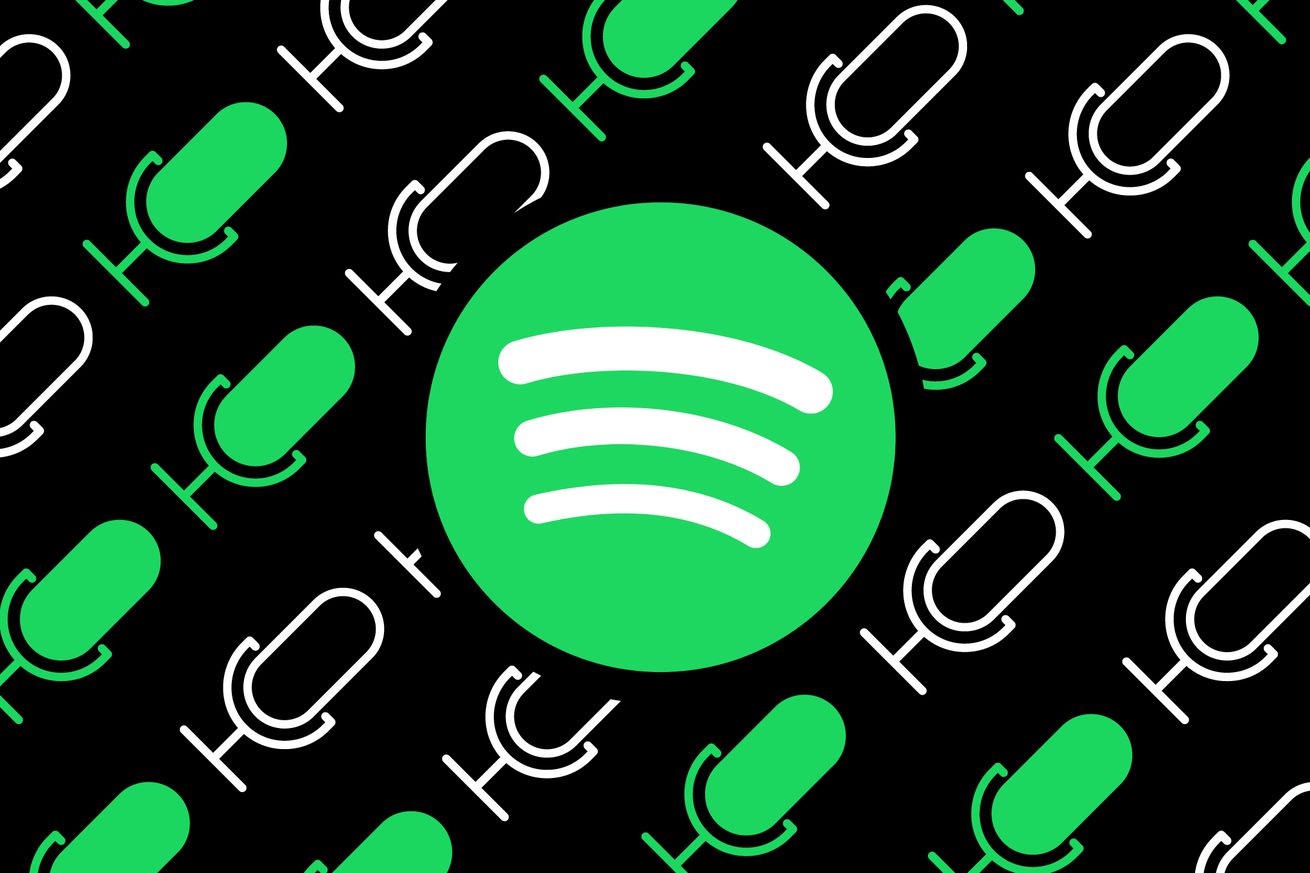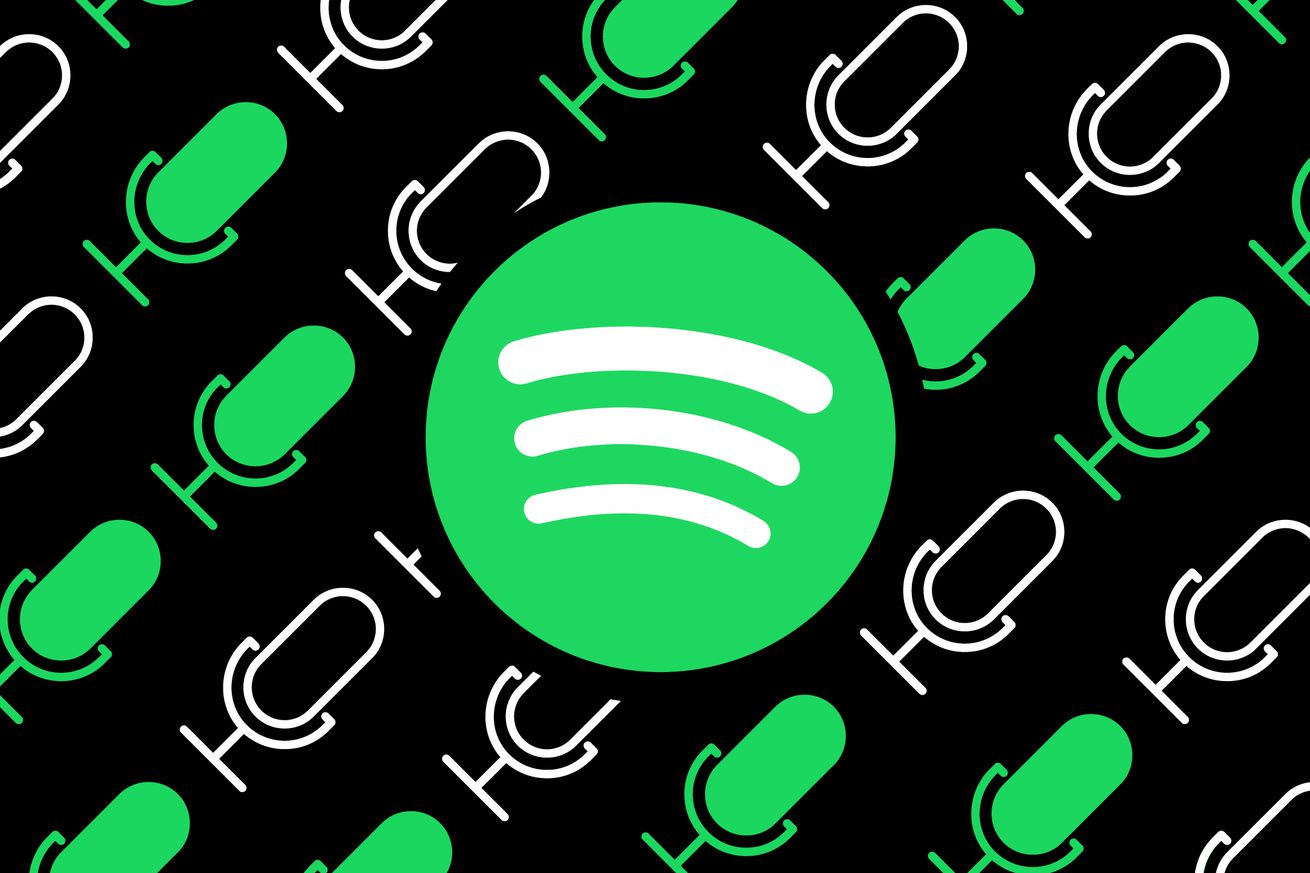
Spotify loosens its grip on exclusive podcasts
This is Hot Pod, The Verge’s newsletter about podcasting and the audio industry. Sign up here for more.
Hello, Hot Podders! We’re kicking off the week with a big announcement.
This won’t come as a surprise to anyone who attended Hot Pod Summit in February, but I am very pregnant. Like baby-keeps-kicking-the-laptop-out-of-my-lap pregnant. This is my last week at The Verge before I go on leave. I will be back in September with what will likely be a lot of catching up to do on the audio business since my plans for the next five months mainly entail diapers and not sleeping. So if you see a frizzy, bedraggled new mom pushing a sage green UPPAbaby around Ditmas Park this summer, feel free to say hi! It might be me or one of the dozens (hundreds?) of other people in the neighborhood who fit that description.
Luckily, an excellent reporter is stepping in to write Hot Pod while I am gone. I’d like to introduce you all to Amrita Khalid, an extremely knowledgeable tech journalist who has written for publications including Inc., Quartz, and The Daily Dot. Amrita has some great ideas for what to do with the newsletter while I’m gone, and I’m certain you’ll be in good hands. You can expect the same thorough dispatch of news and analysis each week (same goes for Insider subscribers), and if you want to say hi or start sending news over, you can reach Amrita at Amrita.Khalid@theverge.com or @askhalid on Twitter.
And now, a quick hello from Amrita:
Hi everyone! I’m so excited to take over the reins at Hot Pod for the next several months. I can’t replace the inimitable Ariel, but I hope you’ll enjoy (or at least be amused by) my West Coast perspective on the podcast industry. I currently reside in Los Angeles, which of course has its own vibrant podcast and audio production scene. I’m so happy to be on board and look forward to getting to know you all better as the year progresses.
Alright, on with the news. Today, Gimlet gets a distribution boost, Spotify gets searching for a new audiobook chief, and Pew gets into the consumption habits of podcast listeners.
Gimlet will expand distribution of some of its shows beyond Spotify, starting with Science Vs
Gimlet staff were told in recent weeks that some of their shows will be distributed on other audio platforms, Semafor reported on Sunday. The first such move will be making the current season of Science Vs available on other apps like Apple Podcasts and Google Podcasts. It’s a big change for the studio, which has chafed under Spotify’s exclusivity model.
“Given our position as the leading global podcast platform, we are expanding our windowing strategies to increase the audiences and ad sales potential of our shows,” Spotify spokesperson Emily Yeomans said in a statement to Hot Pod. “In this case, we’re pursuing broad distribution for some of our original podcasts like Science Vs. This will be done on a case by case basis and over time.”
Science Vs, which first launched in 2016, has had a batch of its most recent episodes available across platforms since Spotify acquired Gimlet in 2019. For the past few years, only the four most-recent episodes have been available at a given time. The entire new season, which started in March, will be widely available, as well as four episodes from the last season.
Science Vs is one of the network’s biggest shows and was part of the original slate of Gimlet podcasts that made the studio such a hot commodity to begin with. When Spotify bought the studio, it had some of the most popular independent shows on the market, which also included Heavyweight and — its biggest hit — Reply All. That combination of critically acclaimed (and high-performing) podcasts fetched Gimlet a price tag of more than $190 million, plus as much as $45 million in staff payouts over the following four years.
But things have been rockier for Gimlet since then. Reply All imploded under a racism scandal, and the studio has failed to generate new hits on the same scale. That is not to say the studio hasn’t seen new successes — scripted series Case 63 and Wall Street Journal collaboration, The Journal, have done very well. But the kind of shows the studio was known for — highly produced, quirky, nonfiction podcasts — have failed to gain traction. Three such shows, How To Save a Planet, Crime Show, and Every Little Thing, were canceled last fall.
After the cancellations and resulting layoffs, members of the Gimlet union blamed Spotify’s exclusivity strategy for disappointing numbers. Although the shows were not behind a paywall (free subscribers to Spotify could access them, as well), they did not enjoy the kind of wide distribution that the shows did before the acquisition. It’s not like they don’t have a big platform — according to a study by Cumulus and Signal Hill, Spotify is tied with YouTube as the most-used podcasting platform. But even then, it only has about one-fifth of the market.
Spotify’s decision to expand distribution for Science Vs, and potentially other Gimlet shows, could be interpreted as an acknowledgment of the limitations of the exclusivity model. There is no argument that it has worked extremely well for established celebrity shows like The Joe Rogan Experience and Call Her Daddy. But those podcasts were able to build followings across platforms before consolidating their audiences on Spotify. If Science Vs ends up setting a precedent for other Gimlet shows, it will bring the studio’s distribution strategy in closer alignment with outlets like SiriusXM and Wondery, which focus more so on getting listeners (and ad money) than bringing listeners to a particular platform.
And this wider strategy has worked before for Spotify. Sports and pop culture podcast studio The Ringer has been a bright spot in Spotify’s podcast portfolio; it also has had its shows distributed wide since it was acquired in 2020. That is reportedly thanks to Ringer founder Bill Simmons lobbying Ek to keep it that way. And Gimlet hit The Journal? It’s also available on platforms like Apple Podcasts and Google Podcasts.
Spotify’s audiobook chief will depart this fall
Yesterday, I reported that Nir Zicherman, who leads Spotify’s audiobook vertical, plans to leave the company in October. His departure will come close to a year after audiobooks launched on the platform.
Zicherman came to Spotify in 2019 as one of the co-founders of Anchor, which Spotify acquired for $150 million. Zicherman has been working on ways that the company can monetize audiobooks beyond the established methods. Right now, Spotify has an a la carte purchase model similar to Apple Books. When I spoke to Zicherman back in February, he said that Spotify was considering ad-supported titles or even a Netflix-style all-you-can-listen subscription.
“Applying a blanket approach to everything — every piece of content, every creator, just like in podcasting — I think actually hurts the industry,” Zicherman said at Hot Pod Summit. “So the future that I see at Spotify is many different business models to support all the different types of podcast content that exists and all the different types of audiobook content that exists.”
Zicherman will stay on to transition in the next audiobook lead, and the search has started for an external candidate to take the job. While Zicherman has spearheaded Spotify’s audiobook strategy, there will be some continuity in leadership. He works closely with David Kaefer, the company’s VP of business affairs, according to Spotify spokesperson Rosa Oh. Kaefer will also support the transition and continue working with the company’s new audiobook leader.
Spotify’s entrance into the audiobook industry is the biggest shakeup that well-trod market has seen in years, but the effort has not yet reached its full potential. The a la carte purchase model has hit some roadblocks thanks to Apple’s stringent (and arbitrary) in-app purchase rules, preventing users from having a pathway to buy titles from the Spotify app. Whatever new model Spotify debuts, whether it is under Zicherman or his successor, will need to get around those rules if it is to become the game-changer CEO Daniel Ek predicts it will be. In a pitch to investors last year, Ek said he believes the market is potentially worth $70 billion globally.
Additionally, Zicherman was one of the last of the original cohort of founders and executives who came to Spotify to build its (now massive) podcasting business. His co-founder, Michael Mignano, who ran Spotify’s podcasting tech stack, left last June. In the past year, Spotify has also witnessed the departure of its top podcast dealmaker Courtney Holt, Gimlet co-founder Alex Blumberg, Gimlet general manager Lydia Polgreen, the company’s chief content and advertising officer Dawn Ostroff, and Parcast founder and head of talk creator content and partnerships Max Cutler.
Now, over to Amrita on the latest from the Pew podcasting survey.
Pew: Overwhelming majority of listeners believe the news they hear on podcasts
Americans seem to really trust podcasts — both as a form of news and an impetus for lifestyle changes, according to a Pew poll released on Tuesday. A whopping 87 percent of respondents said they expected the news they hear on podcasts to be mostly accurate.
News isn’t the initial draw, though. Only about two-thirds of listeners tuned in to “[stay] up to date with current events” — entertainment was a much bigger motivator, with 87 percent selecting it as a reason. It seems that while fewer people actively seek podcasts as a source of news rather than of entertainment, they take the factual information they do hear rather seriously.
That might also speak to why podcasts have been so effective at influencing listener behavior. Pew’s poll found that 60 percent of people reported buying a book, watching a movie, or listening to music due to a podcast. More than a third made a lifestyle change, such as trying a new diet or journaling due to a podcast.
In fact, 88 percent of those polled said they listened to podcasts in order to learn. Yes, learn. Even if the learning perhaps involves recaps of the latest episodes of Succession or intermittent fasting and not the latest on the war on Ukraine, this does suggest that most listeners trust podcasters not to lead them astray.
This insight arrives as trust in the traditional broadcast and print news media seems to be at historic lows. And despite the high trust in the accuracy of news in podcasts, a sizable portion of those polled don’t listen to the ones made by actual news outlets. Nearly two-thirds of listeners told Pew that the podcasts they listen to are not connected to a legacy news organization.
That’s all for now! It’s been a wild year reporting for you guys, and it’s about to get wilder (for me personally as a first-time parent — I can’t speak to how things will play out in the audio industry). Amrita will be back next week with the latest news and analysis.

